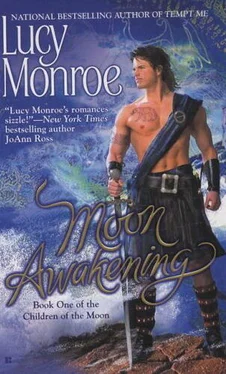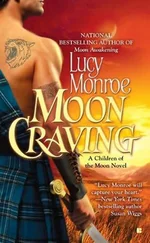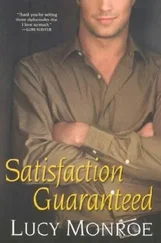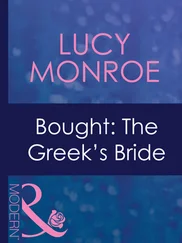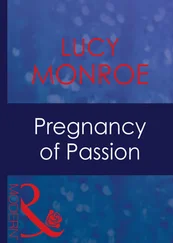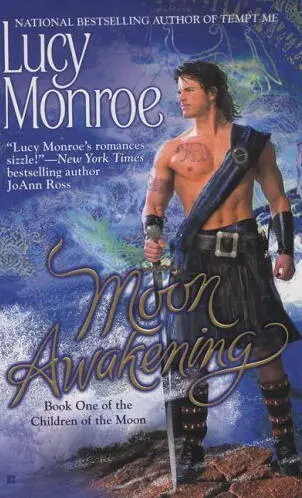
Moon Awakening
(The first book in the Children of the Moon series)
Lucy Monroe
For Christine Feehan and Sherrilyn Kenyon.
Thank you for making me fall in love with the paranormal genre and for awakening new characters in my heart. Your books have given me many hours of pleasure. I hope my Children of the Moon touch my readers even half as much.
Sincerely,
Lucy Monroe
Millennia ago God created a race of people so fierce even their women were feared in battle. These people were warlike in every way, refusing to submit to the rule of any but their own… no matter how large the forces sent to subdue them. Their enemies said they fought like animals. Their vanquished foes said nothing, for they were dead.
They were considered a primitive and barbaric people because they marred their skin with tattoos of blue ink. The designs were usually simple. A single beast was depicted in unadorned outline, though some clan members had more markings which rivaled the Celts for artistic intricacy. These were the leaders of the clan, and their enemies were never able to discover the meanings of any of the blue-tinted tattoos.
Some surmised they were symbols of their warlike nature and in that they would be partially right. For the beasts represented a part of themselves that these fierce and independent people kept secret at the pain of death. It was a secret they had kept for the centuries of their existence while most migrated across the European landscape to settle in the inhospitable north of Scotland.
Their Roman enemies called them Picts, a name accepted by the other peoples of their land and lands south… They called themselves the Chrechte.
Their animal-like affinity for fighting and conquest came from a part of their nature their fully human counterparts did not enjoy. For these fierce people were shape-changers and the bluish tattoos on their skin were markings given as a rite of passage. When their first change took place, they were marked with the kind of animal they could change into. Some had control of that change. Some did not. And while the majority were wolves, there were large hunting cats and birds of prey as well.
None of the shape-shifters reproduced as quickly or prolifically as their fully human brothers and sisters. Although they were a fearsome race and their cunning was enhanced by an understanding of nature most humans do not possess, they were not foolhardy and were not ruled by their animal natures.
One warrior could kill a hundred of his foe, but should she or he die before having offspring, the death would lead to an inevitable shrinking of the clan. Some Pictish clans and those recognized by other names in other parts of the world had already died out rather than submit to the inferior, but multitudinous humans around them.
Most of the shape-changers of the Scots Highlands were too smart to face the end of their race rather than blend. They saw the way of the future. In the ninth century ad, Keneth MacAlpin ascended to the Scottish throne. Of Chrechte descent through his mother, MacAlpin was the result of a "mixed" marriage, and his human nature had dominated. He was not capable of "the change," but that did not stop him from laying claim to the Pictish throne (as it was called then). In order to guarantee his kingship, he betrayed his Chrechte brethren at a dinner, killing all of the remaining royals of their people—and forever entrenched a distrust of humans by their Chrechte counterparts.
Despite this distrust, the Chrechte realized that they could die out fighting an ever-increasing and encroaching race of humanity, or they could join the Celtic clans.
They joined.
As far as the rest of the world knew, though much existed to attest to their former existence, what had been considered the Pictish people were no more.
Because it was not in their nature to be ruled by any but their own, within two generations, the Celtic clans that had assimilated the Chrechte were ruled by shape-changing clan chiefs. For the most part, the fully human among them did not know it; however, a few were trusted with the secrets of their kinsmen. Those who knew the secrets were aware that to betray the code of silence meant certain and immediate death.
That code of silence was rarely broken.
"And so the werewolf carried the lass off and neither was ever heard from again." Joan's sepulcher tones faded as the dark shadows in the kitchen reached out to wrap around the two young women listening so avidly to her every word.
Emily Hamilton tried to imagine being carried off into the wild by a werewolf, or being carried off anywhere for that matter, but couldn't. She was nineteen, well past the age when most ladies were married, or even dowered into a convent. She would spend her life as her stepmother's drudge.
She sighed. Not even a werewolf would risk Sybil's wrath to carry Emily off.
"Are there truly werewolves in the Highlands?" her younger stepsister, Abigail, asked in careful Gaelic.
Joan shook her head, nary a wisp of her gray hair peeking from the housekeeper's wimple she wore. "Nay, lass. Though if ever there were a place such monsters might thrive, it would be that harsh and hilly land."
"I thought you said the Highlands were beautiful," Emily inserted, her own Gaelic more natural than Abigail's.
But that was hardly a surprise. Her younger sister speaking at all was the result of Abigail's tenacity. When the fever had almost taken her life three years before, it had taken her hearing. It had also destroyed what existed of family harmony in Emily's home.
Deafness was considered a sign of the damned by some and a curse by most.
Sybil made it clear that she would have preferred her daughter had died rather than be so afflicted. Overnight, Abigail had gone from being an asset her stepmother counted on to advance her own place in the world, to a problem best avoided. It was left to Emily to coax her younger stepsister back to health and into living amidst the household again.
Out of fear that Abigail would be rejected by the rest of the keep like she had been by her own mother, Emily had done her best to hide her sister's affliction. The younger girl had helped, working hard to learn to read lips and continue speaking as if she heard the voices around her.
So far, the deception had succeeded. Few people within the keep knew of the fifteen-year-old's inability to hear.
"It's a beautiful place, or so my mother always told me… but a harder land to live in. Och… the clans are so wild, even the women know how to fight."
Emily thought it sounded like a magical place.
An hour later, the rest of the family and the servants were in bed. Everyone that was, except her father and stepmother. They were in the great hall talking. Emily was usually the last of the family to go to bed and she burned with curiosity to know what was important enough to keep her parents from their slumber.
She stopped at the top of the stairs leading to the great hall and moved into the shadows. Eavesdropping might not be ladylike, but it was a good way to satisfy her curiosity and her need to stay informed of her father and stepmother's plans. Too many others depended on her to protect them from Sybil's machinations and her father's cold indifference to their welfare.
"Surely, Reuben, you cannot expect to send Jolenta!" her stepmother cried.
"The king's order is quite explicit, madam. We are to send a daughter of marriageable age to this laird in the Highlands."
Emily ducked behind a small table, making herself as diminutive as possible. It was not difficult. Much to her personal chagrin, she was not precisely tall. It was a fact tossed at her by Sybil often. She had no "regal bearing," as befitted the daughter of a landholding baron. She supposed there was nothing regal about hiding behind a table, no matter how tall she might have been. And that was that.
Читать дальше
